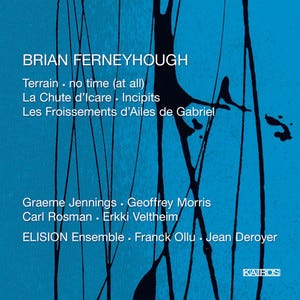Genre of the Day - New Complexity
Album of the Day - Terrain; no time (at all); La chute d'Icare; Incipits; Les froissements d'ailes de Gabriel by Brian Ferneyhough (2010)
As the country has set its sight on another four years of a decidedly chaotic and unproductive last Trump go-around, I yearn for anything but complexity. To understand how the US got to this moment once again requires making one’s way through the thicket of political mess of the past couple of decades, a treacherous and even tedious ask given the immediate, real-life concerns of autonomy and rights at stake. There’s a litany of factors and events that have caused so many millions of Americans to operate out of fear in this scenario, and our social media hyperreality has only served to intensify these emotional appeals and draw more people towards populism. I can’t say I really feel like writing, and the sheer shock that has overcome me and my peers makes my flowery quotidian music writing endeavor feel a bit tone-deaf. But I guess it’s only fitting that, in contrast to yesterday’s palliative hopeful genre, today’s random genre is a complicated, naturalistic, dense environment that in a way mirrors America’s current political reality.
A great musician (Ethel Cain) saying it better tonight than I ever could.
Reality steamrolls us forward. New complexity provides inquiry into the second half of the 20th century’s expeditions into high-concept, theoretically advanced classical music, that placed an increasing emphasis on meticulous methodological concepts of composition and performance and upending constructed ideas of music’s nature. Serialism experimented with the idea of using all notes in a chromatic scale as often as one another, because sure, why not. Indeterminacy, or chance music, turned music into a wager that could be iterated differently with each performance. In the 1980s, new complexity came as a sort of revival of these ideas, though with the added experimental flair of wholly stretching the limits of instruments and their performers.
Even the most seasoned instrumentalist would probably grow pale upon seeing new complexity’s scores. Highly dense and even novel forms of notation peppers the bars of a new complexity composition. The composer Brian Ferneyhough has been one major proponent of what has been dubbed new complexity, although he rejects the term; that’s just how it goes with these things. Whenever they feel pigeonholed into a particular school of thought, even if they did create it, musicians will try to shake off any potential reductionism. Ferneyhough’s compositions employ endlessly complicated notational dynamics, timings and lengths, pedal indications, and so on and so forth. New complexity feels as if the ultimate summation of the brain’s process of transcribing music: it’s as if you can see a musical thought extracted from each and every neuron of a human brain and spliced onto the page with the mystical logic that characterizes all musical creation.
Today's selection of his work reveals how new complexity insightfully delivers on its breadth. “Terrain” retains the extremely tight, controlled nature of the form’s experiments, but there’s a playfulness to the jibber-jabber of the chamber. It gradually densifies, the fluttering intonations of the flutes like incursions by unfamiliar creatures as the musical jungle grows more vast and varied. “No Time At All” borrows the guitar for a full-spectrum inquiry into the instrument—you hear Iberain flourishes to high-fretboard American country picking and avant-garde spindly weaves across its strings. New complexity forces the listener to consider the full prism of these instruments in one small, incredibly complicated microcosm. “Incipits” returns to the sonic fireworks of the introductory track while droplets of drum and percussion murmur underneath. Even while boundlessly labyrinthine, music remains an unfailing balm amidst these trying times.






